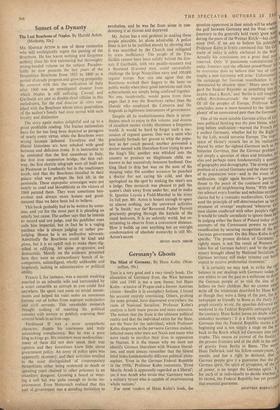Germany's Ghosts
THIS is a very good and a very timely book. The alienation of Germany from the West between 1806 and 1945 is not a new,, theme; but Hans Kohn—a native of Prague and a former Austrian citizen—handles it in exemplary fashion. I found his account entirely convincing. Others, probing the same ground, have discovered everywhere the roots of National Socialism. Professor Kohn's analysis is both more precise and more extensive. The notion that the State is the ultimate political reality and that the individual exists for the State, not the State for the individual, which Professor Kohn diagnoses as the pervasive German malady, infected many who were not Nazis and many who were ready to sacrifice their lives in opposition to Nazism. It is the reason why we must not identify German liberalism with Western liberal- ism, and must always remember that the liberal label hides fundamentally different political philo- sophies. `Even in the German Federal Republic ' in the 1950s,' Professor Kohn comments, 'Ernst Moritz Arndt is apparently regarded as a liberal'; yet it was Arndt who wrote that `Germany needs a military tyrant who is capable of exterminating ' whole nations.'
For most readers of Hans Kohn's book, the
question uppermost in their minds will be whet! the gulf between Germany and the West—whi (contrary to the generally held view) 'grew Aid during the years of the Weimar Reich'—has dot since 1945. If we are to believe his publishe Professor Kohn is firmly convinced that 'the Gel many of today is safely anchored to the Wet Actually his conclusions are a great deal ma reserved. Only 'if passionate concentration e unity, frontiers and the efficient poweriState Ca be overcome does he believe that 'out of cata trophe a new Germany will arise.' Unfortunate' the campaign for German reunification is s'l 'dominated by obsolete ideas.' Many seem to gard the Federal Republic as something less de sirable than a Reich,' and 'Berlin is still longing) called Reichshauptstadt,' the imperial capita Of all the peoples of Europe, Professor Koh, concludes, none is more haunted by the 'demon ghosts' of an unmastered past than the Germans.
One of the most notable German critics of Gel man political thinking was the poet Heine, wh' long before unification—warned the French tha a unified Germany, whether led by the Right by the Left, would terrorise Europe. The iml# tance of Heine's remark lies in his realisation shared by other far-sighted Germans such as Ill historian Gervinus, that the German problem l not simply a question of ideas and attitudes, bn also and perhaps more fundamentally a quest° of geography and demography. The strong centsposition of a united Germany and the sheer weigh of its population were—and in the event of r unification, might again become—`a permanef threat to the peace of the continent and to ty security of all neighbouring States.' With 'MO.° ties athwart every frontier and nebulous territorto claims fed by a romantic medimvalism, German) used the principle of self-determination as an to strument of revenge' employed 'whenever Ot man claims conflicted with other people's rights' It would be totally unrealistic to ignore these Pc in judging either the fears of Poland today or t' attempts of the Communist powers to prove° reunification by securing recognition of the Pt German government. On this Hans Kohn is elol, specific. 'The present division of Germany, P rightly states, is not 'the result of Western mis takes but of German hubris'; and 'in the getter misery brought about by National Socialism, tm German territory still under tyranny can hardy expect to receive preferential treatment.' It is certainly no easy task to strike the ritil balance in our dealings with Germany today. one wishes to use the past as a millstone to titoov the German people or to visit the sins of th fathers on their children. But we cannot sin'IP'; write off the tendencies described by Hans 10111 as though they were a thing of the past, for as, newspaper so friendly to Bonn as the Daily Tel graph recently wrote, the speeches delivered as` weekend in the Federal Republic unhappily pro`, the contrary. Hans Kohn leaves no doubt what considers necessary : it is a frank recognition P'o Germans that the Federal Republic marks a of beginning and is not simply a stage on the viP back to the Reich which led Germany into catlis, trophe. This means an avowal of the finalitY r of the present frontiers and of the shift in the of gravity from Berlin to Bonn. 'The woo, Hans Delbrtick told his fellow-countrymen, '`',` mands, and has a right to demand, that German people give it a guarantee that the 1111..1 German spirit, the spirit of arrogance, of the C of power, is no longer the German spirit.' It for each of us individually to decide whether, o' its record, the Federal Republic has yet prov0 that essential guarantee.
GEOFFREY BARRACLOP






































 Previous page
Previous page